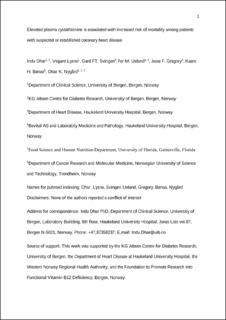Elevated plasma cystathionine is associated with increased risk of mortality among patients with suspected or established coronary heart disease
Dhar, Indu; Lysne, Vegard; Svingen, Gard Frodahl Tveitevåg; Ueland, Per Magne; Gregory, Jesse F.; Bønaa, Kaare Harald; Nygård, Ottar
Journal article, Peer reviewed
Accepted version
Permanent lenke
https://hdl.handle.net/11250/2738673Utgivelsesdato
2019Metadata
Vis full innførselSamlinger
- Department of Clinical Science [2317]
- Registrations from Cristin [9766]
Sammendrag
Background
Elevated circulating cystathionine levels are related to atherosclerotic cardiovascular disease, a leading cause of death globally.
Objective
We investigated whether plasma cystathionine was associated with mortality in patients with suspected or established coronary heart disease (CHD).
Methods
Data from 2 independent cohorts of patients with suspected stable angina pectoris (SAP) (3033 patients; median 10.7 y follow-up; 648 deaths) or acute myocardial infarction (AMI) (3670 patients; median 7.0 y follow-up; 758 deaths) were included. Hazard ratios with 95% CIs per SD increment of log-transformed cystathionine were calculated using Cox regression modeling. Endpoint data was obtained from a national health registry.
Results
Among patients with SAP, there was a positive association between plasma cystathionine and death (age- and sex-adjusted HRs [95% CI] per SD: 1.23 [1.14, 1.32], 1.29 [1.16, 1.44], and 1.17 [1.05, 1.29] for total, cardiovascular, and noncardiovascular mortality, respectively). Corresponding risk estimates were 1.28 (1.19, 1.37) for all-cause, 1.33 (1.22, 1.45) for cardiovascular, and 1.19 (1.06, 1.34) for noncardiovascular death among AMI patients. In both cohorts, estimates were slightly attenuated after multivariate adjustments for established CHD risk factors. Subgroup analyses showed that the relation between cystathionine and all-cause mortality in SAP patients was stronger among nonsmokers and those with lower plasma concentration of pyridoxal-5′-phosphate (P-interaction ≤ 0.01 for both).
Conclusions
Elevated plasma cystathionine is associated with both cardiovascular and noncardiovascular mortality among patients with suspected or established CHD. The joint risk associations of high plasma cystathionine with lifestyle factors and impaired vitamin B-6 status on mortality need further investigation. This trial was registered at clinicaltrials.gov as NCT00354081 and NCT00266487.
